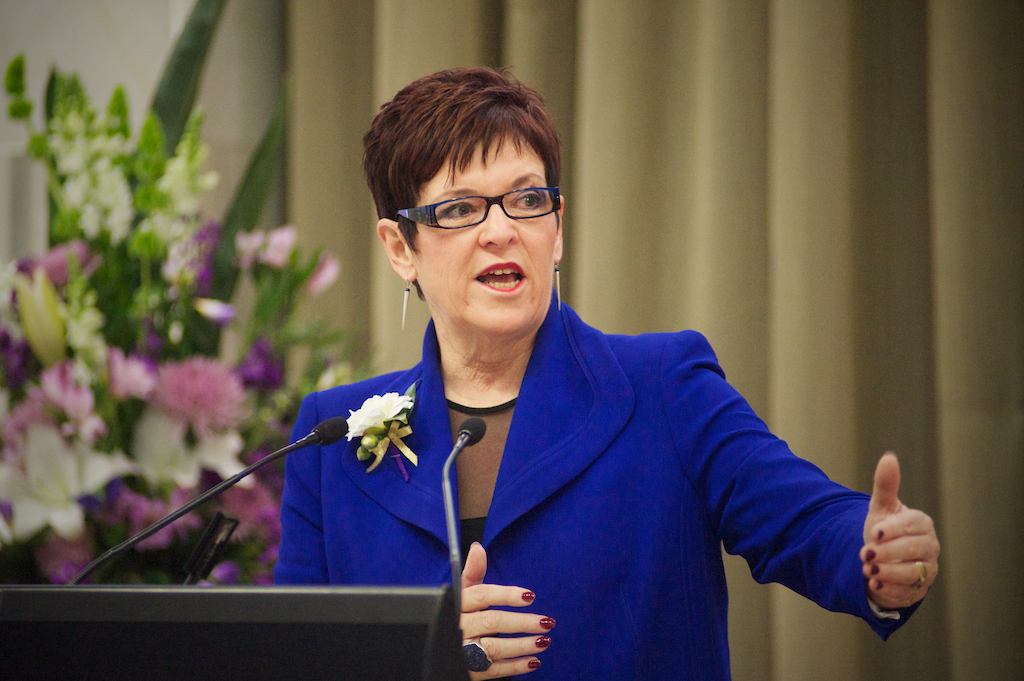By Eleanor Ainge Roy in Dunedin
The former New Zealand prime minister Jenny Shipley has denied writing a controversial opinion piece for a Chinese state-run newspaper headlined: “We need to learn to listen to China.”
The piece drew scathing criticism from New Zealand’s deputy prime minister, Winston Peters, and comes at a time of heightened tensions between the two countries.
This week an opinion piece carrying Shipley’s byline appeared in People’s Daily, a mouthpiece for the Chinese communist party, praising the country for its progress on women, its belt and road initiative, and poverty reduction.
It appeared as the most-read article on the paper’s website on Wednesday.
But Shipley has denied writing the piece, saying it had been constructed from an interview she gave the newspaper in December last year.
“I have not spoken to the China Daily since December,” Shipley told the New Zealand Herald.
“It is important for the foreign minister and prime minister and others to understand that I would never think of getting into a public situation like this at such an important time for New Zealand’s relationship,” she said.
Shipley has significant ties with China, including being the chairperson of the New Zealand branch of the China Construction Bank, a former chairperson for Oravida, which supplies food products to China, as well as being “a regular visitor to China”, according to her LinkedIn profile.
The piece said “women at every level are allowed to share their ideas and jointly make decisions with men in an equal way”, and that 700 million people had been lifted out of poverty in the past 40 years.
“One of the reasons for China’s great successes over the 40 years since reform and opening up was that it connected its people to the markets, which has created huge wave of progress in its industrialisation process,” the piece read.
“The belt and road initiative (BRI) proposed by China is one of the greatest ideas we’ve ever heard globally. It is a forward-looking idea, and in my opinion, it has the potential to create the next wave of economic growth.”
The $900bn BRI project could turn into the world’s largest infrastructure project, but has been beset by suspicion and criticism, with some countries fearing they could become “economic vassals” if they become indebted to Beijing by using – or needing – access to the vast global infrastructure network.
India’s prime minister, Narendra Modi, has accused China of attempting to “undermine the sovereignty of other nations”, and said the scheme was designed to seize strategic control of the Indian Ocean.
Shipley has declined to comment further, and turned down an interview request from the Guardian.
The opinion piece has caused widespread confusion in New Zealand, with people struggling to understand how or why a former prime minister could support a rogue foreign country at a time of strained relations.
China experts said on Wednesday that People’s Daily had a “habit” of making stories up and taking quotes out of context, and it had been a mistake for Shipley to give an interview to the newspaper at all.
The opinion piece comes at a time of growing tensions between New Zealand and China, after New Zealand’s decision to temporarily ban Huawei from being involved in the nationwide rollout of 5G mobile technology, citing security concerns.
New Zealand’s Pacific reset policy – the country’s strengthening of ties in the region to counter growing Chinese influence – as well as a slew of smaller tensions have worsened the marked cooling.
But Jason Young, director of the New Zealand Contemporary China Research Centre at Victoria University, warned that while the current bumps were significant, they were not expected to affect lucrative trade or tourism ties, and were in line with China’s increasingly frosty relationships with the UK, the US and Australia.
 Kiwi female Quisling Jenny Shipley
Kiwi female Quisling Jenny Shipley
Aucun commentaire:
Enregistrer un commentaire